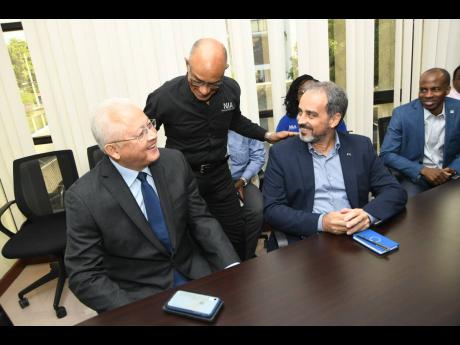Corruption stench rising - Perception of malfeasance in Jamaica increases on watchdog index
Transparency International’s 2019 Corruption Perception Index (CPI) has positioned Jamaica as the fourth most corrupt state among Caribbean countries ahead of Guyana, Trinidad and Tobago, and Haiti.
The 2019 index, released yesterday, showed Jamaica scoring 43, one place lower than the 44 it scored in 2018, in a context where zero is deemed very corrupt and 100 is very clean.
With a score of 43, the country’s ranking has dipped sharply from 70 to 74 out of 180 countries.
Professor Trevor Munroe, head of National Integrity Action, who announced the results of the CPI for Jamaica yesterday, highlighted several events last year that might have contributed to the various scores and ranks of analysts that have allowed for that slippage.
Among the developments in 2019 that Munroe said might have led to Jamaica’s poor showing on the 2019 CPI were the sacking of former Education Minister Ruel Reid and his subsequent arrest and charge on corruption-related charges. Another development listed by Munroe was the disclosure by the Integrity Commission that the statutory declaration of Prime Minister Andrew Holness was not “cleared”.
Looking ahead, Munroe said action must be taken to arrest and reverse the decline by Jamaica on the CPI.
He called for a more effective, broad coalition for integrity comprising civil society organisations, the private sector, the Church, the media, public officials, the Major Organised Crime and Anti Corruption Agency (MOCA), and the Financial Investigation Division (FID).
The NIA boss urged the administration to immediately table in Parliament the long-awaited regulations to bring MOCA into operation fully as an independent entity separate from the police force.
He wants the public disclosure, “as a matter of urgency”, of the Petrojam investigation report and thereafter, action by recently appointed Director of Corruption Prosecutions at the Integrity Commission Keisha Prince.
Munroe is also batting for early parliamentary approval of the new regulations to reduce partisan political influence on the selection of boards to oversee public entities. The regulations were introduced by Finance and the Public Service Minister Dr Nigel Clarke.
The head of the leading corruption watchdog is also pushing for the trial of Reid, Caribbean Maritime University (CMU) President Fritz Pinnock, and others charged with corruption to be prioritised and dealt with expeditiously.
“It cannot be acceptable that the resolution of the matter before the courts drags on for anything close to the six years that it took to resolve the case involving former minister of state Kern Spencer. This would be completely unacceptable and a retrograde step which will be running counter to the pledges so far being honoured by the honourable chief justice.”
Munroe also told journalists that the Parliament should immediately establish the parliamentary committee to provide oversight of the Integrity Commission as a critical first step to giving the anti-corruption body a fresh start. He also wants this committee to review recommendations by the commission to create greater transparency in its operations under the law.
On the question of the findings of the Auditor General’s Department, detailing a plethora of breaches and questionable spending at the CMU, Munroe said the prime minister would be well advised to indicate what actions should be taken in the matter.
He recounted that the prime minister had vowed that corruption would not be tolerated under his watch.
Some reasons Jamaica fell on the corruption index
Head of National Integrity Action Professor Trevor Munroe has listed a number of developments in 2019 that might have contributed to a deterioration of Jamaica’s position in both score and rank.
It had scored 44 for 2017 and 2018 before dropping to 43 for 2019.
1. March 2019 – Resignation of Education Minister Ruel Reid in the context of corruption-related allegations – no reason offered at the time despite enquiry.
2. April 2019 – Investigation report of the sale of Rooms on the Beach property by the contractor general alleging improper conduct.
3. May 2019 – The first press conference of the Integrity Commission. It emerges in that press conference that the prime minister’s statutory declaration had not been “cleared”.
4. July 2019 – The first annual report of the Integrity Commission released – two MPs are under investigation by the Financial Investigation Unit of the Integrity Commission, but their names were not disclosed.
5. July 2019 – Annual report of the Integrity Commission says that the investigation of Petrojam was completed and referred to the director of corruption prosecution. Since then there has been no disclosure regarding the consequences of this referral.
6. August 2019 – Retirement of the director of corruption prosecution from the Integrity Commission following differences between the commissioners and the director regarding Rooms on the Beach report – no reason offered by the retiree.
7. August 2019 – Controversy regarding the statutory declaration of the prime minister and the leader of the Opposition insofar as the declarations only indicated purchase price and not the estimated market of immovable property held by the declarant, spouse, and children as indicated by the third schedule off the Integrity Commission Act.
8. September 2019 – Chairman of the Integrity Commission resigns and no explanation offered.
9. For the entire year, regulations to bring into operation and to make fully independent from the Jamaica Constabulary Force the MOCA, are not yet tabled in the Parliament.
Here is how assessed Caribbean countries appear in the ranking:
The Bahamas
Rank: 29th
Score: 64
Barbados
Rank: 30th
Score: 62
St Vincent and the Grenadines
Rank: 39th
Score: 59
Dominica
Rank: 48th
Score: 55
St Lucia
Rank: 48th
Score: 55
Grenada
Rank: 51st
Score: 53
Cuba
Rank: 60th
Score: 48
Jamaica
Rank: 74th
Score: 43
Guyana
Rank: 85th
Score: 40
Trinidad and Tobago
Rank: 85th
Score: 40
Haiti
Rank: 168th
Score:18

